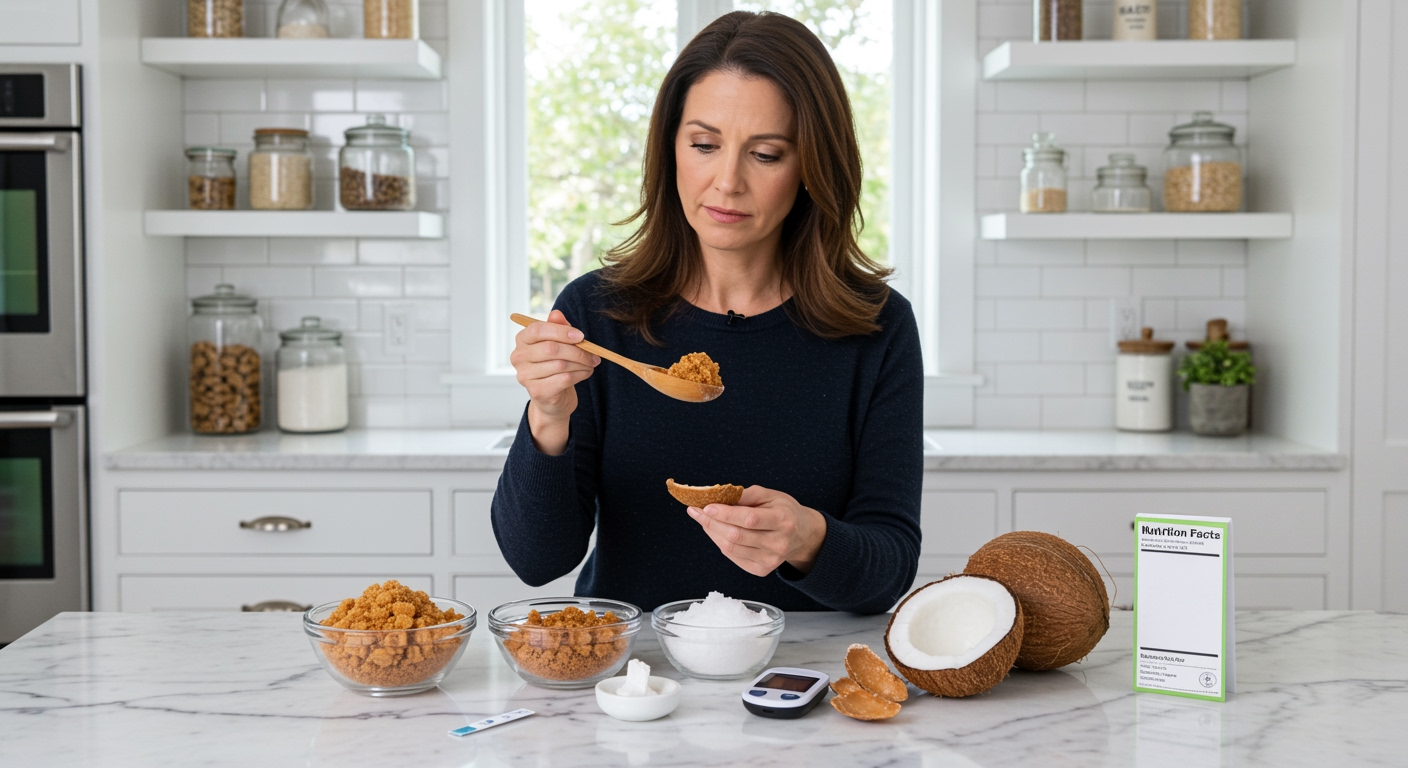✪ Key Takeaway: Coconut sugar affects blood glucose similarly to regular sugar and is not recommended for diabetes management.
Introduction
You walk down the health food aisle and see coconut sugar marketed as a natural, diabetic-friendly alternative to regular sugar.
You might be wondering if this trendy sweetener could finally give you the sweet taste you crave without spiking your blood sugar levels.
Hi, I am Abdur, your nutrition coach and today I am going to explain the truth about coconut sugar and diabetes so you can make informed decisions about your health.
What Makes Coconut Sugar Different From Regular Sugar?
Coconut sugar comes from the sap of coconut palm trees, not from coconuts themselves.
Workers make cuts in the flower buds of coconut palms and collect the flowing sap in containers.
The sap gets heated until the water evaporates, leaving behind brown crystalline granules that look similar to brown sugar.
This process preserves some minerals like potassium, magnesium, and zinc that regular white sugar lacks.
However, the main component of coconut sugar is still sucrose, making up about 70-80% of its content.
The remaining 20-30% consists of fructose and glucose, along with trace amounts of inulin fiber and minerals.
Despite these minor differences, coconut sugar behaves very similarly to regular sugar in your body when it comes to blood glucose response.
✪ Fact: Coconut sugar contains the same amount of calories as regular sugar at 4 calories per gram.
How Does Coconut Sugar Affect Blood Glucose Levels?
The glycemic index of coconut sugar ranges from 35-54, which seems lower than regular sugar at 65.
However, this difference is not significant enough to make coconut sugar safe for people with diabetes.
When you eat coconut sugar, your digestive system breaks down the sucrose into glucose and fructose molecules.
The glucose enters your bloodstream rapidly, causing your blood sugar levels to rise within 15-30 minutes.
Your pancreas responds by releasing insulin to help cells absorb this glucose for energy or storage.
People with diabetes either do not produce enough insulin or their cells resist insulin action, making it difficult to control blood sugar spikes.
The small amount of inulin fiber in coconut sugar provides minimal benefit for slowing down glucose absorption compared to the large amount of sugar present.
✪ Pro Tip: Test your blood sugar 2 hours after eating coconut sugar to see its real impact on your glucose levels.
What Do Studies Say About Coconut Sugar And Diabetes?
Research shows that coconut sugar produces similar blood glucose responses to regular table sugar in both healthy individuals and people with diabetes.
A study published in the Journal of Nutritional Science found no significant difference in postprandial glucose levels between coconut sugar and sucrose.
The American Diabetes Association does not recommend coconut sugar as a suitable sweetener for diabetes management.
Clinical trials demonstrate that people with type 2 diabetes experience blood sugar spikes of 40-60 mg/dL after consuming 25 grams of coconut sugar.
This response is nearly identical to what happens when consuming the same amount of regular white sugar.
The trace minerals in coconut sugar do not provide enough benefit to offset its negative impact on blood glucose control.
Healthcare professionals consistently advise people with diabetes to treat coconut sugar the same way they would treat any other added sugar in their diet.
✪ Note: No major diabetes organization recommends coconut sugar as a safe alternative for people with diabetes.
What Are Better Sweetener Options For Diabetes?
If you have diabetes and want to satisfy your sweet tooth, consider non-nutritive sweeteners that do not affect blood glucose levels.
Stevia, monk fruit, and erythritol provide sweetness without causing blood sugar spikes.
These alternatives have been extensively studied and approved by the Food and Drug Administration for people with diabetes.
Fresh fruits can also satisfy sugar cravings while providing fiber, vitamins, and antioxidants that help slow glucose absorption.
Berries, apples, and citrus fruits have lower glycemic impacts than any form of added sugar, including coconut sugar.
Cinnamon, vanilla extract, and other natural flavor enhancers can add sweetness perception without adding actual sugars to your food.
The key is learning to gradually reduce your overall dependence on sweet tastes rather than simply switching from one sugar to another.
✪ Pro Tip: Gradually reduce sweetener amounts over 2-3 weeks to retrain your taste buds to enjoy less sweet foods.
The Bottom Line
Coconut sugar is not a safe sweetener option for people with diabetes because it affects blood glucose levels almost identically to regular sugar.
Health is not about finding loopholes but about making sustainable choices that truly support your wellbeing.
I would love to hear about your experiences with different sweeteners or any questions you have about managing diabetes through nutrition in the comments below.
References
At NutritionCrown, we use quality and credible sources to ensure our content is accurate and trustworthy. Below are the sources referenced in creating this article:
- Healthline: Coconut Sugar Glycemic Index
- PMC: Coconut Sugar Research Study
- Healthline: Coconut Sugar Nutrition
- WebMD: Health Benefits Coconut Sugar





